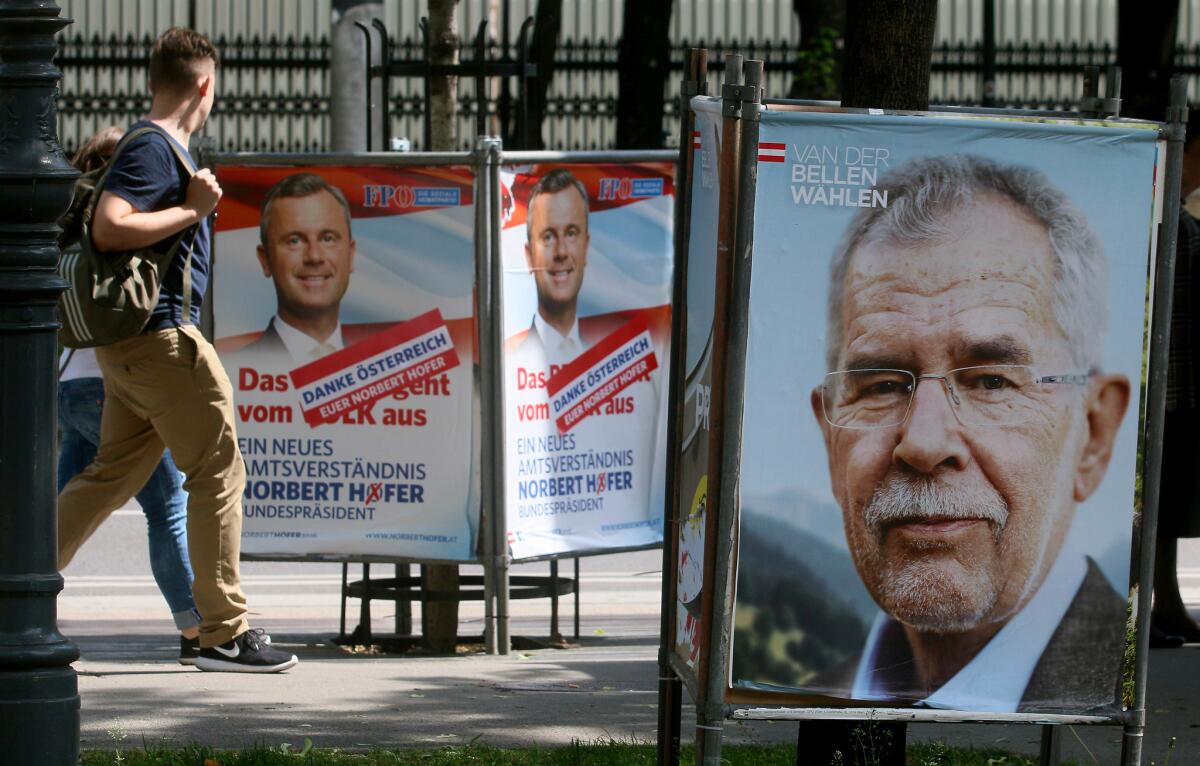Far right falls short in Austria’s presidential election; leftist wins
- Share via
Reporting from Berlin — A left-wing candidate supported by virtually the entire political establishment has narrowly defeated a far-right populist in Austria’s presidential election after a campaign that splintered the country and caused turbulence across Europe.
After absentee ballots were counted Monday, Alexander Van der Bellen, an independent candidate who once led the leftist Greens, emerged as the winner over Norbert Hofer, a 45-year-old gun-toting leader in the far-right Freedom Party who had railed against refugees and migrants as well as the political establishment in Austria. With just 31,000 votes separating the two out of more than 5 million cast, it was the closest presidential election in Austria since before World War II.
Hofer, frequently compared to Donald Trump, was the clear favorite to win the largely ceremonial office in Sunday’s election after coming in first with 35% of the vote in the opening round last month against five other candidates. But opposition to him solidified around Van der Bellen, and Hofer conceded defeat on Monday.
In remarks to reporters, Van der Bellen noted the extreme passions the campaign had engendered. “This election didn’t leave anyone cold,” he said.
But he also suggested that the divisions that the election exposed in Austrian society had been there all along. “There was a lot of commentary in the national and international media about the deep crevices that have opened up in our country,” he said. “I don’t want to over-dramatize that, but these crevices have long existed. No one wanted to look closely at them.”
Hofer’s party was founded by former Nazis in 1956 and had long been on the fringes of Austrian politics. But he held a slim lead Sunday based on the ballots cast at polling stations. The 885,000 absentee ballots counted Monday went decisively for Van der Bellen, giving him 50.3% overall, to Hofer’s 49.7%.

People walk between election posters for Alexander Van der Bellen, right, and Norbert Hofer, left, in Vienna on Monday.
In a Facebook post, Hofer expressed disappointment, but told supporters: “Please don’t despair. The hard work for this campaign hasn’t been wasted, but instead is an investment in the future.”
Hofer’s rise in Austria sent shock waves across the European Union, which has been struggling to find answers to the surge of more than a million refugees who have arrived in the last year from Syria, Afghanistan, Iraq and other troubled spots.
Despite his narrow defeat, analysts believe Hofer’s strong showing could give a boost to populist and right-wing candidates running for office in France, the Netherlands and Germany in the coming months and years.
Hofer’s Freedom Party campaigned hard against immigrants after 90,000 refugees arrived in Austria over the last year. It was the central issue in the campaign and promises to play a key role in elections next year in France and Germany.
Hofer spoke out against “the invasion of Muslims” into Austria and was opposed to allowing in any more refugees. He was also against transatlantic free trade agreements that he says cost Austria jobs. Unemployment doubled to 10% in Austria in the last three years.
Van der Bellen, who was the leader of the Greens party for 11 years, until 2008, ran on a policy of open doors for refugees, as well as greater development of renewable energy.
Hofer had benefited from widespread frustration with Austria’s two mainstream parties, the center-left Social Democrats and the center-right People’s Party, which have ruled Austria and dominated the country’s politics since 1945.
The two parties lost in the first round of voting, leading to a government upheaval this month in which Chancellor Werner Faymann abruptly resigned after more than seven years in power. A new chancellor, Christian Kern, the former chairman of the national railways, was sworn into office last week.
Most of the political establishment coalesced around Van der Bellen, ultimately ensuring his victory.
Kirschbaum is a special correspondent.
UPDATES:
11:08 a.m.: This article has been updated with final results, quotes from Van der Bellen and details.
This article was originally published at 9:09 a.m.
More to Read
Sign up for Essential California
The most important California stories and recommendations in your inbox every morning.
You may occasionally receive promotional content from the Los Angeles Times.













